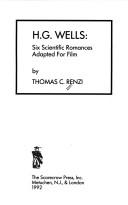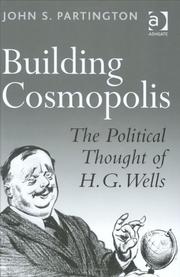| Listing 1 - 10 of 17 | << page >> |
Sort by
|
Book
Year: 2005 Publisher: [Place of publication not identified] Great Neck Publishing
Abstract | Keywords | Export | Availability | Bookmark
 Loading...
Loading...Choose an application
- Reference Manager
- EndNote
- RefWorks (Direct export to RefWorks)

ISBN: 081082549X Year: 1992 Publisher: Metuchen: Scarecrow
Abstract | Keywords | Export | Availability | Bookmark
 Loading...
Loading...Choose an application
- Reference Manager
- EndNote
- RefWorks (Direct export to RefWorks)
Science fiction, English --- Film and video adaptations --- Wells, H. G. --- Film and video adaptations.
Book
ISBN: 0231550162 Year: 2019 Publisher: New York, NY : Columbia University Press,
Abstract | Keywords | Export | Availability | Bookmark
 Loading...
Loading...Choose an application
- Reference Manager
- EndNote
- RefWorks (Direct export to RefWorks)
H. G. Wells played a central role in defining the intellectual, political, and literary character of the twentieth century. A prolific literary innovator, he coined such concepts as "time machine," "war of the worlds," and "atomic bomb," exerting vast influence on popular ideas of time and futurity, progress and decline, and humanity's place in the universe. Wells was a public intellectual with a worldwide readership. He met with world leaders, including Roosevelt, Lenin, Stalin, and Churchill, and his books were international best-sellers. Yet critics and scholars have largely forgotten his accomplishments or relegated them to genre fiction, overlooking their breadth and diversity.In Inventing Tomorrow, Sarah Cole provides a definitive account of Wells's work and ideas. She contends that Wells casts new light on modernism and its values: on topics from warfare to science to time, his work resonates both thematically and aesthetically with some of the most ambitious modernists. At the same time, unlike many modernists, Wells believed that literature had a pressing place in public life, and his works reached a wide range of readers. While recognizing Wells's limitations, Cole offers a new account of his distinctive style as well as his interventions into social and political thought. She illuminates how Wells embodies twentieth-century literature at its most expansive and engaged. An ambitious rethinking of Wells as both writer and thinker, Inventing Tomorrow suggests that he offers a timely model for literature's moral responsibility to imagine a better global future.
Modernism (Literature) --- English fiction --- History and criticism. --- Wells, H. G. --- Criticism and interpretation.
Book
ISBN: 9780231550161 0231550162 9780231193122 0231193122 Year: 2019 Publisher: New York, NY
Abstract | Keywords | Export | Availability | Bookmark
 Loading...
Loading...Choose an application
- Reference Manager
- EndNote
- RefWorks (Direct export to RefWorks)
H. G. Wells played a central role in defining the intellectual, political, and literary character of the twentieth century. A prolific literary innovator, he coined such concepts as "time machine," "war of the worlds," and "atomic bomb," exerting vast influence on popular ideas of time and futurity, progress and decline, and humanity's place in the universe. Wells was a public intellectual with a worldwide readership. He met with world leaders, including Roosevelt, Lenin, Stalin, and Churchill, and his books were international best-sellers. Yet critics and scholars have largely forgotten his accomplishments or relegated them to genre fiction, overlooking their breadth and diversity.In Inventing Tomorrow, Sarah Cole provides a definitive account of Wells's work and ideas. She contends that Wells casts new light on modernism and its values: on topics from warfare to science to time, his work resonates both thematically and aesthetically with some of the most ambitious modernists. At the same time, unlike many modernists, Wells believed that literature had a pressing place in public life, and his works reached a wide range of readers. While recognizing Wells's limitations, Cole offers a new account of his distinctive style as well as his interventions into social and political thought. She illuminates how Wells embodies twentieth-century literature at its most expansive and engaged. An ambitious rethinking of Wells as both writer and thinker, Inventing Tomorrow suggests that he offers a timely model for literature's moral responsibility to imagine a better global future.
Modernism (Literature) --- English fiction --- History and criticism. --- Wells, H. G. --- Criticism and interpretation.
Book
ISBN: 019021211X 0190212101 9780190212100 9780190212094 0190212098 9780190212094 Year: 2016 Publisher: New York
Abstract | Keywords | Export | Availability | Bookmark
 Loading...
Loading...Choose an application
- Reference Manager
- EndNote
- RefWorks (Direct export to RefWorks)
"In this interdisciplinary work, author Ron Edwards offers an innovative rereading of H. G. Wells' "The Island of Dr. Moreau." Edwards utilizes his twenty-five years in biology and the ethics of animal research to examine the bioethical implications of Wells' work and its relevance to contemporary scientific and philosophical discussions. He tackles the myth of human exceptionalism, the notion that we are fundamentally different from the rest of the animal kingdom. We must view ourselves, he argues, not as from animals, but as animals. The approachable tone is suitable for a wide audience of the scientifically curious. At the same time, great care is given to providing an accurate and considered treatment of the technical aspects of the novel, including the scientific plausibility of Dr. Moreau's experiment. Never before have Wells' ideas been examined in such detail by an evolutionary biologist with the author's considerable experience. The implications are far-reaching, touching on key topics in animal rights, evolution, and the relationship between religion and science. Its approachability and dedication to technical accuracy produces a unique perspective on Wells' classic. Anyone with an interest in confronting some of the central issues of human existence through the lens of fiction will be rewarded with an original and thought-provoking work. "-- "The book presents a re-reading of H. G. Wells' novel "The Island of Doctor Moreau" as a key to addressing the controversies of our own humanity. It raises the issue: without human exceptionalism, where do ethics come from?"--

ISBN: 1315261170 9781351954266 1351954261 9781315261171 9780754633839 0754633837 1351954245 1351954253 9781351954242 Year: 2016 Publisher: London
Abstract | Keywords | Export | Availability | Bookmark
 Loading...
Loading...Choose an application
- Reference Manager
- EndNote
- RefWorks (Direct export to RefWorks)
Politics and literature --- History --- Wells, H. G., --- Political and social views. --- Wells, H. G. --- Bliss, Reginald, --- Uells, Gerbert, --- Uėlʹs, Gerbert D., --- Velʹs, Khėrbert Zh., --- Wells, Herbert George, --- Weruzu, H. G., --- Уэльс, Герберт Д., --- Уэллс, Гергерт, --- Вельс, Хэрберт Ж., --- אועלס, ה. ג., --- איאלס, הירברט, --- ולס, ה. ג., --- ולס, ה. ג. --- ולס, הרברט ג׳ורג׳, --- וועלס, הערנערט, --- וולס, ה. ג׳, --- 威尔士赫伯特·乔治, --- 韦尔斯赫·乔,
Book
ISBN: 3111391531 9783111391533 3111029034 Year: 2015 Publisher: Berlin Boston
Abstract | Keywords | Export | Availability | Bookmark
 Loading...
Loading...Choose an application
- Reference Manager
- EndNote
- RefWorks (Direct export to RefWorks)
Fiction --- Fiction writing --- Metafiction --- Writing, Fiction --- Authorship --- Technique. --- Wells, H. G. , --- Wells, H. G. --- Bliss, Reginald, --- Uells, Gerbert, --- Uėlʹs, Gerbert D., --- Velʹs, Khėrbert Zh., --- Wells, Herbert George, --- Weruzu, H. G., --- Уэльс, Герберт Д., --- Уэллс, Гергерт, --- Вельс, Хэрберт Ж., --- אועלס, ה. ג., --- איאלס, הירברט, --- ולס, ה. ג., --- ולס, ה. ג. --- ולס, הרברט ג׳ורג׳, --- וועלס, הערנערט, --- וולס, ה. ג׳, --- 威尔士赫伯特·乔治, --- 韦尔斯赫·乔,
Book
ISBN: 058201235X 9780582012356 Year: 1974 Volume: no. 233 Publisher: Harlow: Longman,
Abstract | Keywords | Export | Availability | Bookmark
 Loading...
Loading...Choose an application
- Reference Manager
- EndNote
- RefWorks (Direct export to RefWorks)
Wells, H. G. --- Wells, H G --- Criticism and interpretation --- -Criticism and interpretation --- Criticism and interpretation. --- Wells, H. G., --- Bliss, Reginald, --- Uells, Gerbert, --- Uėlʹs, Gerbert D., --- Velʹs, Khėrbert Zh., --- Wells, Herbert George, --- Weruzu, H. G., --- Уэльс, Герберт Д., --- Уэллс, Гергерт, --- Вельс, Хэрберт Ж., --- אועלס, ה. --- אועלס, ה.ג --- איאלס, הירברט --- ולס, ה. ג. --- ולס, ה. ג., --- ולס, הרברט ג׳ורג׳ --- וועלס, הערנערט --- וולס, ה. ג׳, --- 威尔士赫伯特·乔治, --- 韦尔斯赫·乔, --- אועלס, ה. ג., --- איאלס, הירברט, --- ולס, הרברט ג׳ורג׳, --- וועלס, הערנערט, --- Wells, Herbert George, - 1866-1946 - Criticism and interpretation --- Wells (herbert george) --- Wells, Herbert George, - 1866-1946
Book
ISBN: 1306411432 0191640018 0199606595 0191738514 9780191640018 9780191738517 9780199606597 9781306411431 Year: 2012 Publisher: Oxford New York Oxford University Press
Abstract | Keywords | Export | Availability | Bookmark
 Loading...
Loading...Choose an application
- Reference Manager
- EndNote
- RefWorks (Direct export to RefWorks)
This is a study of the literary theories of H.G. Wells, the founding father of English science fiction and once the most widely read writer in the world. It explores his career, during which he produced popular science, educational theory, history politics, and prophecy, as well as realist, experimental, and science fiction.
Wells, H. G. -- (Herbert George), -- 1866-1946 -- Criticism and interpretation. --- English --- Languages & Literatures --- English Literature --- Wells, H. G. --- Criticism and interpretation. --- Aesthetics. --- Bliss, Reginald, --- Uells, Gerbert, --- Uėlʹs, Gerbert D., --- Velʹs, Khėrbert Zh., --- Wells, Herbert George, --- Weruzu, H. G., --- Уэльс, Герберт Д., --- Уэллс, Гергерт, --- Вельс, Хэрберт Ж., --- אועלס, ה. --- אועלס, ה.ג --- איאלס, הירברט --- ולס, ה. ג. --- ולס, ה. ג., --- ולס, הרברט ג׳ורג׳ --- וועלס, הערנערט --- וולס, ה. ג׳, --- 威尔士赫伯特·乔治, --- 韦尔斯赫·乔, --- אועלס, ה. ג., --- איאלס, הירברט, --- ולס, הרברט ג׳ורג׳, --- וועלס, הערנערט, --- Wells, H. G. ,
Book
ISBN: 1442656867 1442633557 9781442633551 9781442656864 9781442651845 1442651849 Year: 1961 Publisher: Toronto
Abstract | Keywords | Export | Availability | Bookmark
 Loading...
Loading...Choose an application
- Reference Manager
- EndNote
- RefWorks (Direct export to RefWorks)
This is a sensitive study of Wells' imaginative development during his formative years.
Science fiction, English --- History and criticism. --- Wells, H. G. , --- Criticism and interpretation. --- Wells, H. G. --- Bliss, Reginald, --- Uells, Gerbert, --- Uėlʹs, Gerbert D., --- Velʹs, Khėrbert Zh., --- Wells, Herbert George, --- Weruzu, H. G., --- Уэльс, Герберт Д., --- Уэллс, Гергерт, --- Вельс, Хэрберт Ж., --- אועלס, ה. ג., --- איאלס, הירברט, --- ולס, ה. ג., --- ולס, ה. ג. --- ולס, הרברט ג׳ורג׳, --- וועלס, הערנערט, --- וולס, ה. ג׳, --- 威尔士赫伯特·乔治, --- 韦尔斯赫·乔,
| Listing 1 - 10 of 17 | << page >> |
Sort by
|

 Search
Search Feedback
Feedback About UniCat
About UniCat  Help
Help News
News